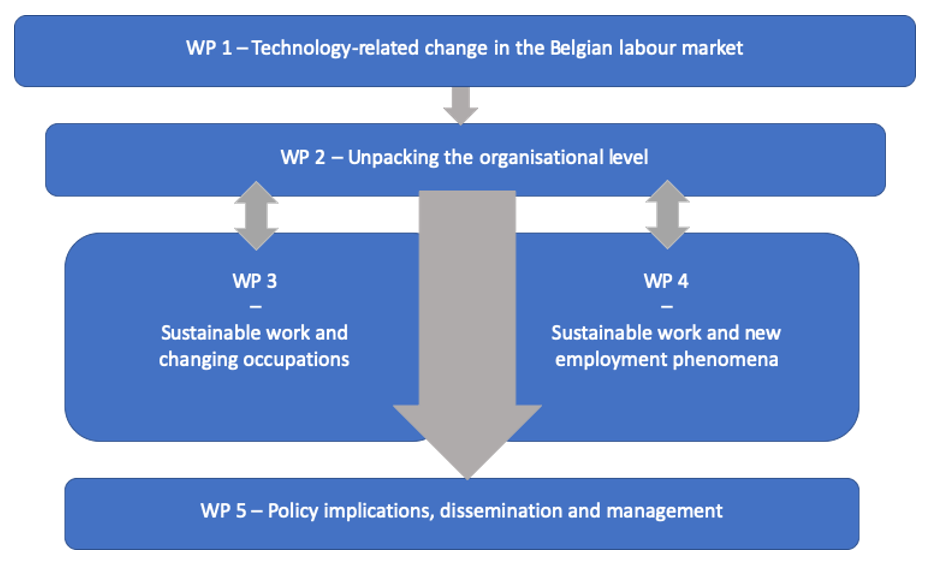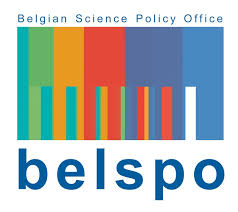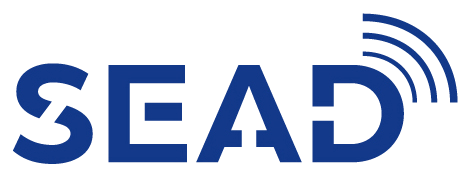Objectives
The overarching objective of the SEAD project is to assess the potential for sustainable work and employment in the digital era in Belgium, by identifying challenges, obstacles and opportunities in both emerging and changing labour market segments.
Sustainable employment is a notion that includes not only an assessment of the health-related impact of work, but extends to broader aspects of the quality of working life. Therefore, concepts such as ‘social protection’, ‘personal growth’ and ‘work-life balance’ will be studied thoroughly in the context of the SEAD project. The analyses performed in the different work packages will lead to advice about how Belgian social policies can help to optimise the opportunities of digitalisation and limit the vulnerability of workers.

These are the specific objectives of the SEAD project:
1. To map out the processes of technology-related change in the Belgian labour market by studying trends in labour market structure, labour market composition and the content of work tasks over the past decades (WP1).
The first work package (WP1) is concerned with macro analyses of labour market and work sustainability outcomes, in order to study the ‘real processes’ of change in work and employment related to new technology.
- Work task 1.1. A thorough review of the recent international economic literature about the effects of the digital revolution for labour markets.
- Work task 1.2. Data requests and ethical procedures.
- Work task 1.3. To describe the change in the sectoral and occupational composition of the Belgian labour market over the past decades, compare this evolution to neighbouring countries and analyse how this relates to workers’ characteristics.
- Work task 1.4. To describe the changing task composition of Belgian occupations and how this relates to workers’ characteristics.
- Work task 1.5. To investigate which types of work tasks have been declining/growing in Belgium and the implications for skills and competence requirements in the Belgian labour force.
- Work task 1.6. To investigate the effects of the digital revolution on individual labour market outcomes for declining and growing occupational profiles.
2. To look for organisational models, HR practices and management styles that optimise job quality and well-being in a context of technological innovation, since the organisational level is an important mediator between technological innovations and actual work experiences at the individual level (WP2).
The second work package (WP2) focuses on the organisational challenges and decisions related to (the implementation of) new technologies and the consequences for sustainable employment.
- Work task 2.1. A review of the literature on organisational strategies and practices regarding the implementation of digital technologies and their possible contribution to sustainable employment.
- Work task 2.2. To set up a comparative Case Study Design, in which two levels of analysis are identified: cases (25 organisations with broadly implemented digital technologies) and embedded cases (occupations).
- Work task 2.3. Data collection, involving both interviews with a high-ranking executive, document collection and workshops with case representatives.
- Work task 2.4. Data analysis, using the technique of pattern-matching in order to identify which constellations of organisational structures and organisational contextual factors may relate to different sustainability outcomes.
3. To study the processes and effects of occupational change related to technological innovation in the Belgian labour market, in terms of skill requirements, job content and employment quality (WP3).
The third work package (WP3) aims to study the processes and effects of technology-related change from the perspective of workers in a selected number of ‘transversal occupations’.
- Work task 3.1. A literature review focusing on existing (case) studies about the changing job content and working conditions of specific occupations.
- Work task 3.2. To select a number of ‘transversal occupations’ (occupational profiles that tend to exist in many sectors) that are heavily affected by technological change.
- Work task 3.3. Design and execution of a recruitment and fieldwork strategy in which individual workers (embedded cases) from the selected occupations will be recruited from the organisations included in WP2.
- Work task 3.4. Field work, consisting of in-depth interviews about two narratives: ‘the impact of technology-related change on a regular working day/week’ and ‘technology-related change from a career perspective’.
- Work task 3.5. Data analysis, using in-depth narrative methods revealing the lived experience of changing technological and organisational environments in relation to aspects of sustainability.
4. To gain insight into the phenomena of (digital) platform work and platform-based freelance work, studying the socio-demographic profile, the skills composition, the job content and the employment conditions of the workers involved (WP4).
The fourth work package (WP4) contains an in-depth study of the platform economy in Belgium.
- Work task 4.1. Literature review on platform work from a sustainable work perspective.
- Work task 4.2. To describe the socio-demographic, professional and economic profile of platform workers in a detailed manner and to create an empirical typology of workers based on these characteristics.
- Work task 4.3. To study – by means of an online survey – the work and employment conditions, health and well-being, social protection, income (security) and career prospects of platform workers.
- Work task 4.4. A qualitative study – by means of in-dept interview – on sustainable employment, adopting a career perspective.
5. To translate the findings of the different work packages in (social) policy advices aimed at safeguarding and promoting the sustainability of employment in a context of digitalisation (WP5).


Research funded by Belspo
SEAD
Sustainable employment in the age of digitalisation – Research project
